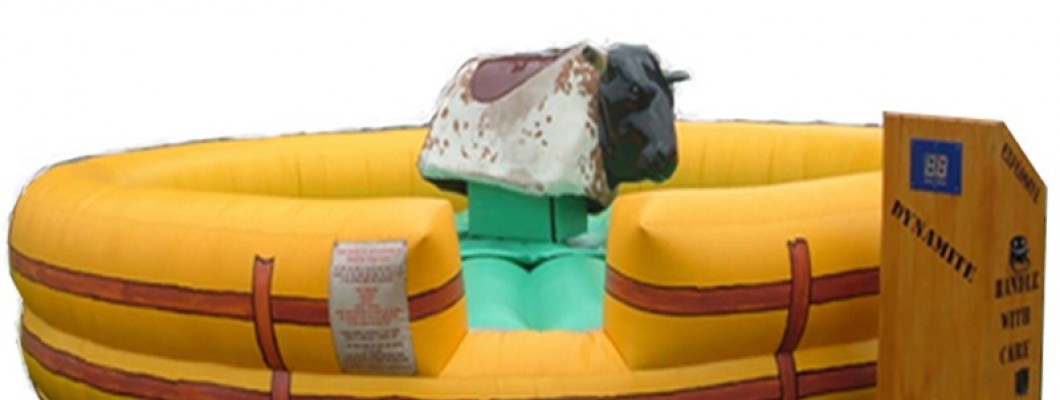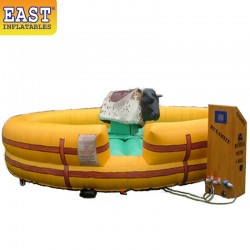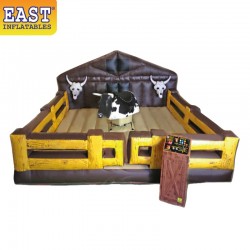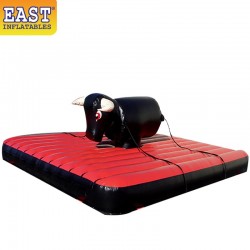15 Apr


Starting a mechanical bull business requires careful planning and preparation to ensure success. Here is a checklist of the nine essential steps to follow:
1. Conduct Market Research and Identify Target Customers
- Time: 2-4 weeks
- Cost: $500-$1,000
- Details: Understand the local market dynamics, customer preferences, and identify potential competitors.
2. Develop a Comprehensive Business Plan
- Time: 4-6 weeks
- Cost: $1,000-$2,500
- Details: Outline your business objectives, strategies, and financial projections to guide your business's direction.
3. Create a Compelling Brand Identity and Logo
- Time: 2-4 weeks
- Cost: $500-$1,500
- Details: Develop a strong brand identity that resonates with your target audience and stands out in the market.
4. Secure Funding or Investment
- Time: Varies
- Cost: Depends on funding needs
- Details: Obtain the necessary capital to cover startup costs and initial expenses through investments or loans.
5. Obtain Necessary Permits and Licenses
- Time: 4-6 weeks
- Cost: $500-$1,000
- Details: Ensure all legal requirements are met to operate your mechanical bull rental service legally.
6. Purchase or Lease Quality Equipment
- Time: 2-4 weeks
- Cost: $5,000-$15,000
- Details: Acquire high-quality mechanical bulls and other necessary equipment for safe and efficient operation.
7. Hire and Train Qualified Operators
- Time: 2-4 weeks
- Cost: $1,000-$2,000
- Details: Recruit and train operators to ensure they provide safe and engaging experiences for customers.
8. Develop Pricing Structures and Rental Packages
- Time: 1-2 weeks
- Cost: $500-$1,500
- Details: Create competitive and profitable pricing models to attract and retain customers.
9. Establish Marketing Strategies
- Time: Ongoing
- Cost: $1,000-$3,000 per month
- Details: Promote your business through various channels like social media, event publications, and direct marketing to build visibility.
Total Estimated Startup Cost:
$10,000-$30,000+
Each step is crucial for laying a strong foundation for your business. By carefully planning each stage, you can greatly increase your chances of establishing a successful mechanical bull rental business. Good luck on your entrepreneurial journey!
Additional Considerations:
1. Market Research
- Objective: Identify and understand your target market to tailor services that meet their specific needs.
- Details: Analyze local demographics, customer preferences, and competition. Use surveys and focus groups to gather feedback.
2. Regulatory Compliance
- Objective: Obtain necessary permits and licenses to operate legally and ensure safety.
- Details: Required documentation may include general business licenses, amusement permits, and safety certifications.
3. Quality Equipment
- Objective: Invest in high-quality, durable mechanical bulls with safety features.
- Details: Equipment should include adjustable speed settings, safety mechanisms, and should be sourced from reputable manufacturers.
4. Qualified Staff
- Objective: Hire and train operators to ensure safety and customer satisfaction.
- Details: Staff should have experience with mechanical bulls, excellent communication skills, and a strong understanding of safety protocols.
5. Pricing and Packages
- Objective: Develop competitive and profitable pricing structures and rental packages.
- Details: Offer various options to meet different customer needs, such as hourly rates or full-day rentals. Ensure pricing transparency to build trust.
6. Marketing and Promotion
- Objective: Use effective marketing strategies to attract customers.
- Details: Leverage social media, local event publications, and word-of-mouth. Create engaging content like videos and photos of the mechanical bull in action.
7. Financial Planning
- Objective: Create a detailed business plan with financial projections.
- Details: Include startup costs, monthly expenses, and revenue forecasts. Use this plan to secure funding or investment.
By following these steps, you can establish a mechanical bull rental business that not only entertains but also adheres to high safety standards and operational efficiency. Each element from equipment quality to marketing plays a crucial role in the success of the venture.




Leave a Comment